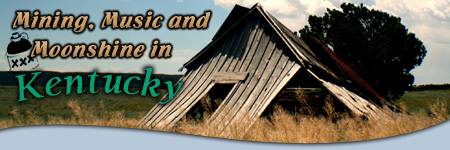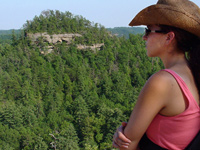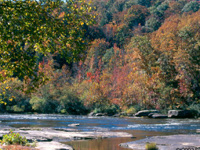|

Mining, Music and Moonshine in Good Ole' Kentucky
Banjo
notes cascade over the bourbon-colored river. Hidden among
the oaks and magnolias, a fiddle embroiders the Appalachian
folk tune. Our paddles pause, then stop. We drift downstream,
two city slickers in a canoe, trespassers amongst the hills
of southeastern Kentucky.
The
Cumberland Plateau, once a sandstone massif, melted into ridges,
caves and deep, twisting bottomlands. The Scotch-Irish settled
these remote stretches, trailblazed 250 years ago by Daniel
Boone. The hollows still ferment the best and worst of local
color.
 |
|
Southern
belle, Barbara Rivera Holmes, surveys the landscape
near
the Natural Bridge. |
The
sugar maples hide scenes of deliverance and redemption. Scratch
farmers struggle beside trailers shaggy with kudzu. Poverty
tempts some to crime. Moonshiners brew 100-proof "corn
squeezings", decanted into jugs and jam jars, then furtively
peddled among the dry counties. In 2000, these hills produced
40 percent of the country's marijuana, a $3.9-billion crop
in a region where the average household earned under $8,000.
But
then a fiddler and banjo picker strike up a tune - and the
region's sweetness shines through. Entire clans linger in
a river bend, picnicking by the swimming hole. Women patch
quilts and sip tea, rocking on the porch. Neighbors gather
to clog, reel and do the electric-slide.
"Dip
for the oyster, dive for the clam," the caller cries
to the dancers on Hoedown Island. "Now take a dip for
the promised land." A white-haired gent in cowboy boots
and a sailor hat swings an earnest 7-year-old.
A
man with a mullet mohawk lifts his knees to the "Beverly
Hillbillies" theme. He partners briefly with a buxom
girl in a Hooters t-shirt, which reads "delightfully
tacky, yet unrefined."
Like
square dancing and strip-club promo-wear, many of the locals'
enthusiasms sit poorly with their health-conscious, politically
correct kinfolk elsewhere: eatin' vittles such as fried catfish
and buttermilk biscuits. Huntin' and fishin'. Teasin' rattlesnakes.
Boilin' kettles of 100-proof white lightening in illegal backwoods
sills, protected by juju charms: dead turtles or crude manikins
of gourd and corncobs.
Jugs of this "fighting whiskey" tap the deeper wellsprings of aggression, explained Professor David W. Maurer in "Kentucky Moonshine". "There is no affability, no sense of well-bring, no pleasant camaraderie … After hours or - in some communities - days of drinking, the imbiber attains the state of more or less permanent homicidal torpor, and, even thought rendered immobile and partly blind, is to be considered lethal as long as his fingers are not too stiff to release a trigger."
Indeed, this corrugated country conceals many dark deeds. In the 1930s, two brothers accidentally dropped their father's coffin down a cliff. Incensed, one fatally shot the other, then retreated to a rockshelter for the rest of his life. The hermit carved his crime into the wall, complete with an illustration of the weapon.
Retired legislator Harry M. Caudill explored the "tragedy of the mountains" in his classic book "Night Comes to the Cumberlands":"It is compounded of Indian wars, Civil War and intestine feuds, of layered hatreds and of violent deaths. To it's sad blend, history has added the curse of coal as a crown of sorrow."
Pitched battles raged from the 1930-50s, as miners fought for better pay, benefits and working conditions. "A machine gun sat on top of this building, " said Bobbi Gothard of the Kentucky Coal Mining Museum in Benham. "There were blood and bodies lying in the streets."
Yet the plateau has some happy endings. The area once had the nation's highest maternal death rate; ten thousand people lived in this remote backwater, 60 miles from the nearest road. Not one was a licensed physician.
Enter Mary Breckinridge in 1925. She imported British midwives, gave them horses and riding britches, and began ministering to the mountain folk. By 1958, mothers were four times less likely to die during childbirth here than elsewhere in America. Today the Frontier Nursing Service runs a hospital and the country's largest midwifery school.
 |
The Upper Cumberland River |
Once scraped raw by loggers and strip miners, southeastern Kentucky billows with trees. Black bears have recolonized the slopes. Ecotourism protects - rather than despoils - the area's beauty and natural resources. Galleries and inns sprout in the husks of mining camps. Artisans quilt, weave baskets, braid rag rugs, whittle bowls and craft cornhusk dolls.
The revival is by no means complete. The 2000 Census shows population is still draining from the Cumberland Plateau. Unemployment is high. The state just plummeted in a study of child well being; Kentucky ranks 42nd out of 50, due to poverty and poor health care.
Yet it's still possible to glimpse rare notes of grace … a neighborly wave on a country road; horizons untainted with electric light; families that gather together on lazy summer afternoons, playing in the fresh mountain streams …
Writer Robert Hendrickson once pointed out: "Only in the last 75 years or so has 'civilization' courted these people, yet they still haven't succumbed to it." As we float down the Red River Gorge - pierced by sunlight and fiddle tunes - it's all too easy to agree.
Despite the mining scars, despite the meager money, despite the moonshine and monkey business, the music celebrates the spirit of the Cumberlands - and that is not a thing to be missed. |